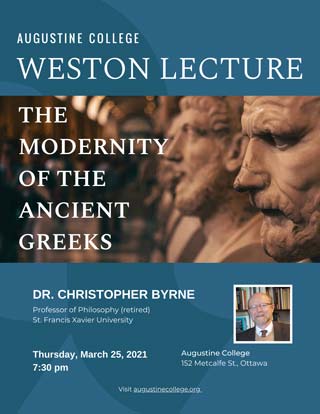SHARE: on Twitter on Facebook
Our 23rd annual Weston Lecture, titled The Modernity of the Ancient Greeks, was given by Dr. Christopher Byrne.
Ancient Greek philosophy still sparks much debate. Can nature be subject merely to a scientific understanding of matter or is it something more? Is morality or human happiness based on feelings or virtues? How are human institutions founded and for what purpose?
The ancient Greeks of the sixth and fifth centuries B.C. saw themselves as inheritors of a past civilization that was both illustrious and deeply ignorant about the world. In place of the old beliefs, the Pre-Socratic philosophers argued for three claims, which they saw as grounded in a new, scientific understanding of nature: 1) a strictly materialist account of nature; 2) subjectivism in human morality; and 3) conventionalism in the understanding of human institutions. The philosophical revolution inaugurated by Socrates, Plato, and Aristotle held that this new, more scientific view of the world was incomplete. In particular, against the above three claims, they argued that: 1) the natural world is more than just matter; 2) the human virtues are good independent of individual belief and necessary for human happiness; and 3) there is a foundation for human institutions in human nature. This debate, I argue, is still with us today.
Christopher Byrne has authored several scholarly articles on Aristotle and Plato, and a recently published book on Aristotle’s natural philosophy, Aristotle’s Science of Matter and Motion (University of Toronto Press, 2018).
Event Bio


